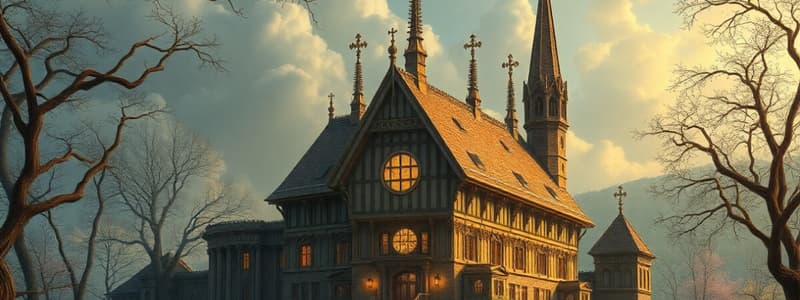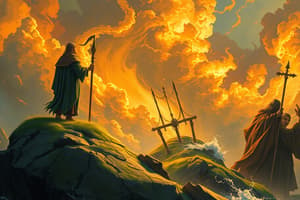Podcast
Questions and Answers
Which epic poem is considered a foundational work of the Anglo-Saxon period?
Which epic poem is considered a foundational work of the Anglo-Saxon period?
- Paradise Lost
- The Canterbury Tales
- Beowulf (correct)
- The Faerie Queene
What event brought French influence to England, impacting its literature during the Medieval Period?
What event brought French influence to England, impacting its literature during the Medieval Period?
- The Enlightenment
- The Renaissance
- The Viking Invasions
- The Norman Conquest (correct)
Which of Shakespeare's plays is a tragedy?
Which of Shakespeare's plays is a tragedy?
- Hamlet (correct)
- A Midsummer Night's Dream
- As You Like It
- Twelfth Night
Who wrote Paradise Lost, retelling the biblical story of the Fall?
Who wrote Paradise Lost, retelling the biblical story of the Fall?
Which author is known for writing satirical poems like The Rape of the Lock?
Which author is known for writing satirical poems like The Rape of the Lock?
What literary movement emphasized emotion, imagination, and the individual?
What literary movement emphasized emotion, imagination, and the individual?
Which novelist is known for works depicting social problems and the lives of the poor during the Victorian era?
Which novelist is known for works depicting social problems and the lives of the poor during the Victorian era?
Which literary device involves a contrast between what is said and what is actually meant?
Which literary device involves a contrast between what is said and what is actually meant?
Which author wrote the novel Heart of Darkness, exploring themes of imperialism and alienation?
Which author wrote the novel Heart of Darkness, exploring themes of imperialism and alienation?
What is literature intended for performance known as?
What is literature intended for performance known as?
Flashcards
Literature in English
Literature in English
Written works created in the English language across various countries and time periods, including poetry, prose, and drama.
Beowulf
Beowulf
An epic poem and a foundational work reflecting the values and beliefs of early Germanic peoples in England.
The Canterbury Tales
The Canterbury Tales
A collection of stories that provides insights into medieval society and character.
William Shakespeare's Plays
William Shakespeare's Plays
Signup and view all the flashcards
The Rape of the Lock
The Rape of the Lock
Signup and view all the flashcards
Jane Austen's Novels
Jane Austen's Novels
Signup and view all the flashcards
Charles Dickens's Novels
Charles Dickens's Novels
Signup and view all the flashcards
Ulysses
Ulysses
Signup and view all the flashcards
Prose
Prose
Signup and view all the flashcards
Metaphor
Metaphor
Signup and view all the flashcards
Study Notes
- Literature in English encompasses writings, including poetry, prose, and drama.
- Works are written in English across various countries and time periods.
- The origin traces back to the Anglo-Saxon period and continues to evolve.
Anglo-Saxon Period (c. 450-1066)
- Beowulf reflects the values and beliefs of the early Germanic peoples settling in England.
- Beowulf remains a foundational work as an epic poem.
- Caedmon's Hymn marks the appearance of Christian themes in Old English literature.
- King Alfred's prose translates and preserves vital Latin texts for a wider audience.
Medieval Period (1066-1485)
- The Norman Conquest in 1066 introduced French influence, which blended with English traditions.
- Geoffrey Chaucer's The Canterbury Tales provides insights into medieval society and character.
- The Canterbury Tales is a collection of diverse stories.
- Sir Thomas Malory's Le Morte d'Arthur retells Arthurian legends, shaping chivalry and courtly love ideals.
Renaissance (1485-1660)
- The Renaissance saw renewed classical learning interest and creativity.
- William Shakespeare's plays, like Hamlet and A Midsummer Night's Dream, remain central to the literary canon.
- Christopher Marlowe's dramas, such as Doctor Faustus, explored ambitious characters and intellectual themes.
- Edmund Spenser's The Faerie Queene uses allegory to celebrate virtues and explore political ideas.
- The King James Bible (1611) influenced English language and literary style.
17th Century
- John Donne's metaphysical poetry used wit and ingenuity to explore emotions and concepts.
- John Milton's Paradise Lost retells the biblical Fall story, examining good, evil, freedom, and obedience.
- Francis Bacon's essays emphasized empirical observation and practical wisdom.
18th Century
- The Age of Enlightenment emphasized reason, order, and social progress.
- Alexander Pope's satirical poems, like The Rape of the Lock, mocked social follies.
- Jonathan Swift's Gulliver's Travels is a satirical critique of human nature and political institutions.
- Samuel Johnson's Dictionary of the English Language standardized English vocabulary and grammar.
- Daniel Defoe (Robinson Crusoe) and Samuel Richardson (Pamela) pioneered the novel as a literary form.
Romantic Period (c. 1789-1837)
- The Romantic movement emphasized emotion, imagination, and the individual.
- William Wordsworth and Samuel Taylor Coleridge (Lyrical Ballads) celebrated nature and imagination.
- Lord Byron's narrative poems and rebellious persona captured Romanticism's spirit.
- Percy Bysshe Shelley's poems explored revolution, freedom, and ideal love.
- John Keats's odes focused on beauty, mortality, and art.
- Jane Austen's novels (Pride and Prejudice, Emma) commented on English society manners and relationships.
Victorian Period (1837-1901)
- The Victorian era was marked by social change, industrialization, and moral earnestness.
- Charles Dickens's novels (Oliver Twist, Great Expectations) depicted social problems and the lives of the poor.
- The Brontë sisters (Charlotte, Emily, Anne) wrote novels exploring love, passion, and social constraints.
- George Eliot (Mary Ann Evans) examined moral dilemmas and human relationships.
- Alfred, Lord Tennyson's poetry reflected duty, patriotism, and melancholy ideals.
- Robert Browning's dramatic monologues explored psychological complexities and moral ambiguities.
- Thomas Hardy's novels (Tess of the d'Urbervilles, Jude the Obscure) portrayed individuals' struggles against fate and social forces.
Modern Period (1901-1945)
- Modernism experimented, fragmented, and rejected traditional values.
- Joseph Conrad's novels (Heart of Darkness) explored imperialism, alienation, and human nature's dark side.
- James Joyce's Ulysses used stream-of-consciousness to portray people's inner lives.
- Virginia Woolf's novels (Mrs. Dalloway, To the Lighthouse) explored consciousness, memory, and subjective experience.
- T.S. Eliot's poetry (The Waste Land) reflected modern society's disillusionment and fragmentation.
- William Butler Yeats's poetry drew on Irish mythology and folklore to express personal and political concerns.
- George Orwell's novels (Animal Farm, Nineteen Eighty-Four) offered dystopian visions of totalitarianism and political power dangers.
Postmodern Period (1945-Present)
- Postmodernism challenges traditional notions of truth, meaning, and authority.
- Samuel Beckett's plays (Waiting for Godot) explored existential themes of absurdity and meaninglessness.
- Harold Pinter's plays used pauses and ambiguity to create unease and tension.
- Contemporary novelists like Salman Rushdie, Margaret Atwood, and Toni Morrison explore identity, globalization, and social justice.
- Postcolonial literature examines colonialism's impact on cultures and identities.
- Diverse voices and perspectives have broadened English literature.
- English literature evolves, reflecting contemporary social, cultural, and political concerns.
Poetry
- Poetry evokes meaning by using language's aesthetic and rhythmic qualities.
- Common elements include meter, rhyme, and figurative language.
- Forms include sonnets, ballads, epics, and free verse.
Prose
- Prose lacks metrical structure.
- Includes novels, short stories, essays, and biographies.
- Includes narrative, descriptive, expository, and argumentative modes.
Drama
- Drama is intended for performance.
- Includes tragedies, comedies, histories, and tragicomedies.
- Relies on dialogue, stage directions, and dramatic structure.
Literary Theory
- Literary theory provides frameworks for interpreting literature.
- Includes formalism, structuralism, post-structuralism, feminism, Marxism, and postcolonialism.
- Literary theory influences reading, analysis, and understanding.
Major Themes
- Love and relationships
- Identity and self-discovery
- Good versus evil
- Power and authority
- Social justice and inequality
- The human condition
- Nature and the environment
- Time and mortality
- Faith and doubt
Key Literary Devices
- Metaphor: comparing things without using "like" or "as."
- Simile: A comparison between two unlike things using "like" or "as".
- Personification: Giving human qualities to inanimate objects or abstract ideas.
- Irony: A contrast between what is said and what is meant (verbal), what is expected and what happens (situational), or what the audience knows and what a character knows (dramatic).
- Symbolism: Using objects, people, or ideas to represent something else.
- Allusion: A reference to a well-known person, event, or literary work.
- Imagery: Descriptive language creates a vivid picture.
- Theme: The central idea.
Studying That Suits You
Use AI to generate personalized quizzes and flashcards to suit your learning preferences.




